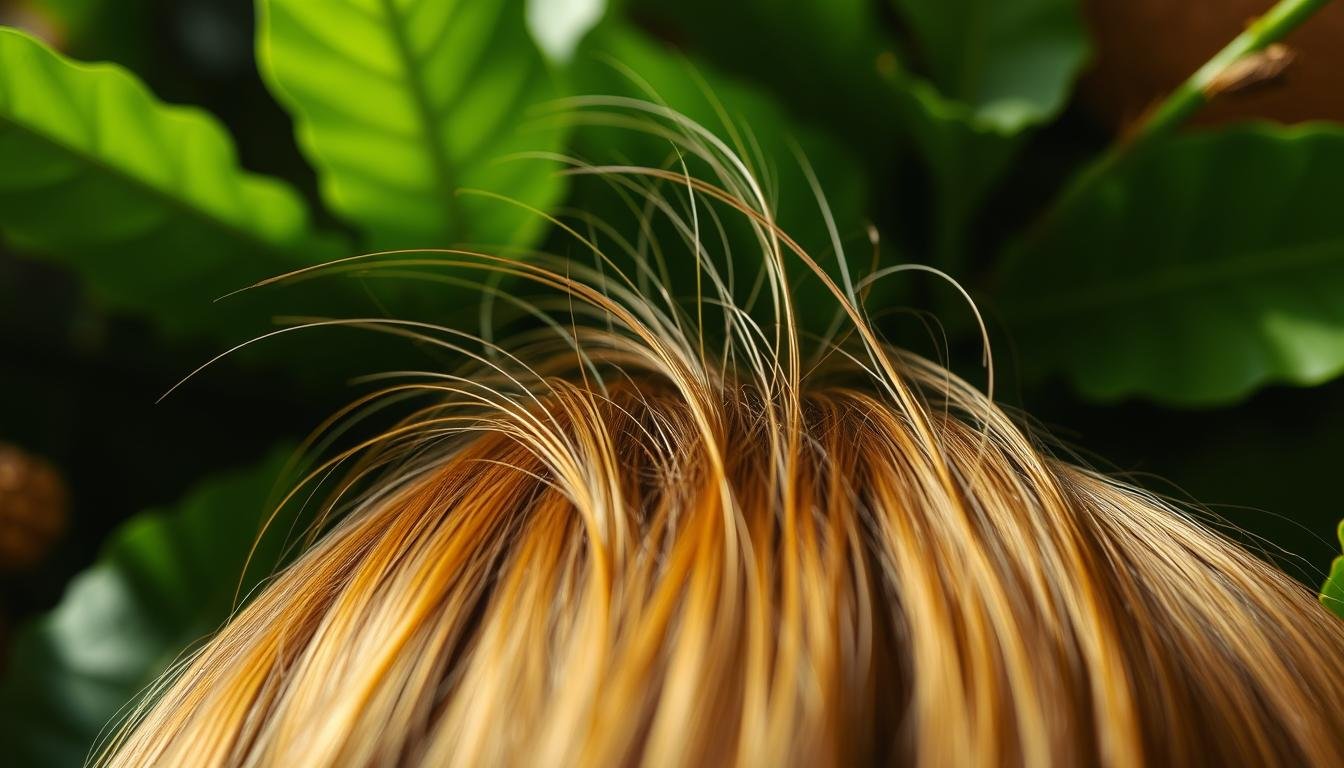How to Grow Hair Faster? Expert Tips for Healthy Hair Growth
Did you know that the average person loses 50-100 strands of hair per day, yet the human head contains 100,000 to 150,000 hairs? This astounding fact highlights the importance of understanding hair growth and adopting effective strategies to maintain a healthy, vibrant head of hair. In this comprehensive Guide, we’ll explore expert-backed tips and techniques to prevent hair loss and promote faster hair growth, empowering you to achieve your desired hair goals.
Key Takeaways
- Understand the different phases of hair growth to identify and address any underlying issues
- Incorporate essential vitamins, minerals, and superfoods into your diet for stronger, healthier hair
- Adopt gentle hair care practices, including the right shampoo and conditioner, to minimize damage
- Prioritize scalp health through regular massages and the use of nourishing essential oils
- Make lifestyle changes, such as reducing stress and exercising regularly, to support hair growth
Understanding Hair Growth Phases
Achieving healthy, fast-growing hair requires Understanding the intricate phases of the hair growth cycle. This cycle is composed of three distinct stages: anagen, catagen, and telogen. By comprehending these phases, you can implement effective hair growth strategies and address issues like hair thinning solutions.
Anagen: The Growth Phase
The anagen phase is the active growth stage of the hair follicle. During this phase, hair follicles are stimulated, and new hair strands emerge from the scalp. This phase can last anywhere from 2 to 7 years, and it’s the longest phase of the hair growth cycle.
Catagen: The Transition Phase
The catagen phase is a brief transitional stage, lasting about 2 to 3 weeks. During this time, the hair follicle shrinks, and the hair shaft separates from the dermal papilla, the structure that stimulates follicles. This phase marks the end of active growth and the beginning of the resting phase.
Telogen: The Resting Phase
The telogen phase is the resting stage, where the hair follicle remains dormant for approximately 3 to 4 months. During this time, the old hair strand is released, and a new hair begins to grow in its place. This phase is crucial for understanding hair thinning and shedding, as it’s normal to lose up to 100 hairs per day during this stage.
By understanding these hair growth phases, you can develop targeted strategies to stimulate follicles and promote healthy, faster-growing hair. Stay tuned for the next section, where we’ll explore the role of nutrition in maintaining hair health.
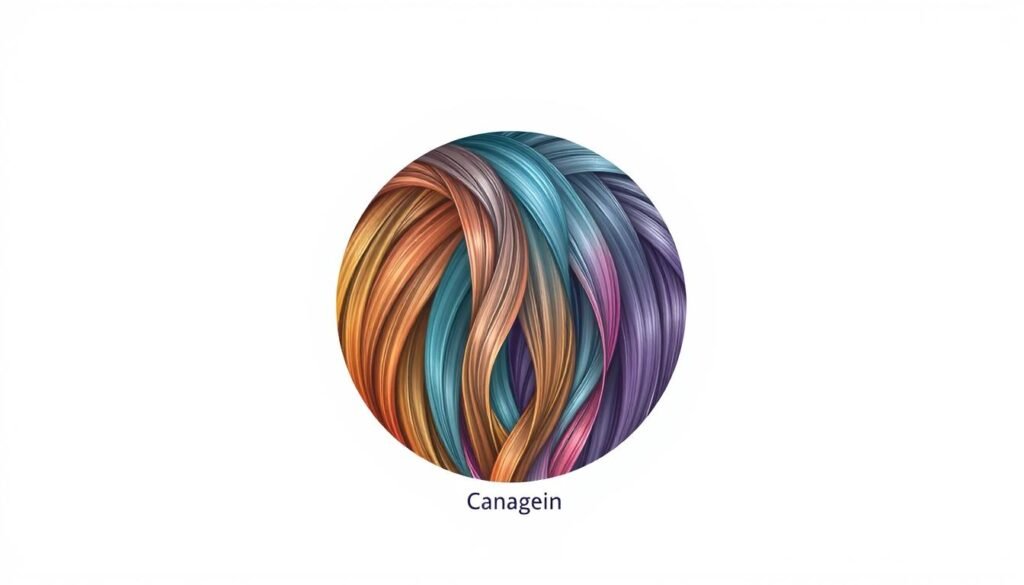
Nutrition for Hair Health
Proper nutrition plays a vital role in maintaining healthy, vibrant hair. To promote new hair growth and prevent vitamin deficiencies, it’s essential to understand the key vitamins, minerals, and superfoods that support hair health.
Essential Vitamins and Minerals
A balanced diet rich in the following nutrients can help nourish your hair from the inside out:
- Biotin (vitamin B7) – Supports keratin production, which is crucial for hair growth and strength.
- Iron – Helps deliver oxygen to the scalp, promoting healthy hair follicles.
- Vitamin C – Aids in collagen production, which is essential for hair structure and elasticity.
- Zinc – Plays a role in oil gland function and hair follicle health.
Superfoods for Stronger Hair
Incorporating nutrient-dense superfoods into your diet can provide a boost of essential vitamins and minerals to support hair growth and overall hair health. Some top choices include:
- Avocados – Rich in biotin, vitamin E, and healthy fats to nourish the scalp.
- Spinach – High in vitamins A, C, and iron, which are crucial for hair follicle health.
- Salmon – Contains omega-3 fatty acids that help reduce inflammation and promote hair growth.
The Role of Hydration
Staying hydrated is just as important for your hair as it is for the rest of your body. Drinking enough water helps maintain a healthy scalp, prevents dryness, and supports the overall condition of your hair. Aim for at least 8 cups of water per day to keep your locks looking their best.

By incorporating these essential vitamins, minerals, and hydration practices into your daily routine, you can support the health and growth of your hair from the inside out.
Hair Care Practices to Promote Growth
Achieving healthy, fast-growing hair requires more than just good genes. Adopting the right hair care practices can make a significant difference in supporting natural hair growth. From gentle washing techniques to choosing the ideal shampoo and conditioner, this section delves into the essential steps to promote luxurious locks.
Gentle Washing Techniques
Frequent and vigorous hair washing can actually hinder hair growth by stripping the scalp of its natural oils. Instead, opt for a gentle, low-frequency washing routine. Avoid scrubbing the scalp harshly, as this can irritate the skin and damage the hair follicles. Gently massage the shampoo into the scalp using your fingertips, and rinse thoroughly with lukewarm water to maintain a healthy, balanced scalp environment.
Choosing the Right Shampoo and Conditioner
When it comes to hair regrowth products, selecting the right shampoo and conditioner is crucial. Look for formulas that are free of harsh chemicals, such as sulfates, parabens, and silicones, as these can dry out the hair and scalp, leading to breakage and stunted growth. Instead, gravitate towards natural, nourishing ingredients like biotin, keratin, and essential oils that support the hair’s natural growth cycle.
| Ingredient | Benefit |
|---|---|
| Biotin | Promotes healthy hair growth and strength |
| Keratin | Strengthens and repairs damaged hair |
| Essential Oils | Nourish the scalp and stimulate natural hair growth |
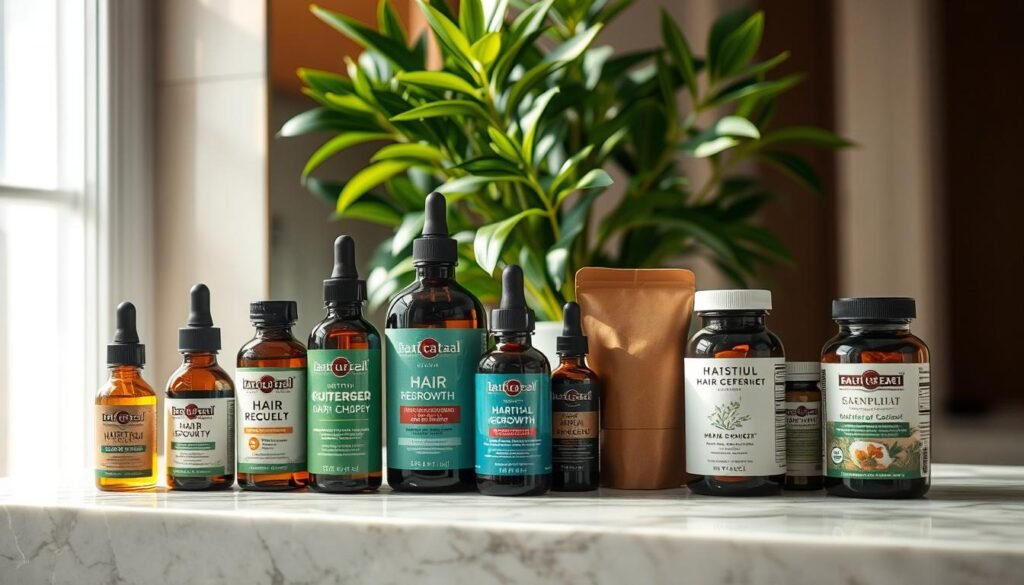
“Gentle, natural hair care is the key to unlocking your hair’s full growth potential.”
By implementing these hair care practices and selecting the right hair regrowth products and natural hair growth solutions, you can help create an optimal environment for your hair to thrive and reach new lengths.
Scalp Health: Key to Hair Growth
A healthy scalp is the foundation for lush, vibrant hair. When your scalp is in top condition, it can stimulate follicles and promote new hair growth. In this section, we’ll explore the benefits of scalp massages and the power of essential oils to nourish your scalp and unlock your hair’s full potential.
Benefits of Scalp Massages
Regular scalp massages offer numerous advantages for hair health. By gently manipulating the skin on your head, you can:
- Improve blood circulation, delivering vital nutrients to hair follicles
- Reduce stress and tension, which can inhibit hair growth
- Stimulate the scalp, promoting new hair growth
- Exfoliate the scalp, removing dead skin cells and product buildup
Incorporating a few minutes of scalp massage into your routine can be a game-changer for your hair’s vitality and shine.
Essential Oils for Scalp Nourishment
In addition to regular scalp massages, incorporating essential oils can provide a powerful boost of nourishment. Some of the best oils for stimulating follicles and promoting new hair growth include:
- Rosemary Oil – Improves circulation and cell regeneration
- Peppermint Oil – Invigorates the scalp and helps unclog follicles
- Lavender Oil – Soothes the scalp and reduces stress-related hair loss
- Cedarwood Oil – Helps regulate sebum production and balance the scalp
Incorporate these essential oils into your haircare routine, either by adding a few drops to your shampoo or using them in a scalp-nourishing hair mask. Your scalp and hair will thank you!
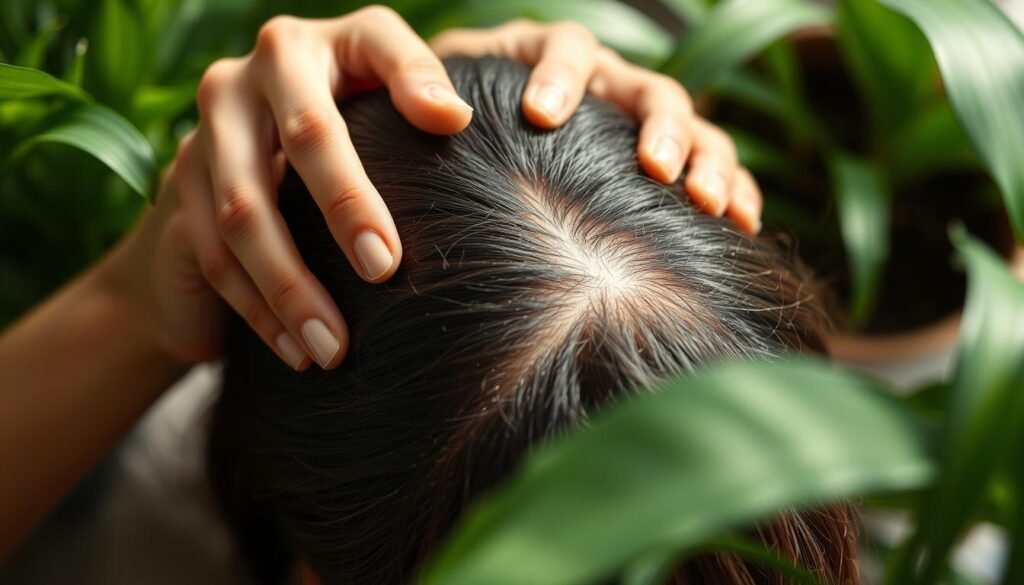
“A healthy scalp is the foundation for strong, beautiful hair. By focusing on scalp care, you can unlock your hair’s full growth potential.”
Avoiding Damage to Your Hair
Protecting your hair from damage is crucial for maintaining healthy, vibrant locks. From heat styling to chemical treatments, there are various ways your hair can become compromised, leading to Hair Loss or thinning. In this section, we’ll explore expert tips to safeguard your hair and prevent these common issues.
Heat Protection Tips
Excessive heat from styling tools like blow dryers, curling irons, and straighteners can severely dry out and weaken your hair, making it more susceptible to breakage. To prevent heat-related damage, always use a high-quality heat protectant spray or serum before styling. This creates a barrier that shields your strands from the damaging effects of hot tools.
- Limit the use of hot styling tools to 1-2 times per week.
- Set your tools to the lowest effective heat setting.
- Allow your hair to air-dry as often as possible.
- Invest in a salon-grade heat protectant product.
Minimizing Chemical Treatments
Chemical processes like coloring, bleaching, and perming can also take a toll on your hair’s health, leading to Hair Loss treatments and hair thinning solutions. To minimize the damage, consider reducing the frequency of these treatments and opting for gentler, ammonia-free formulas when possible.
- Space out chemical treatments by 8-12 weeks.
- Avoid overlapping multiple chemical services.
- Consult a professional stylist to determine the safest options.
- Use a deep conditioning treatment after each chemical service.

“Protecting your hair from damage is the first step towards healthy, vibrant locks. With the right precautions, you can minimize the impact of heat and chemicals, and enjoy the hairstyle you desire without compromising your hair’s integrity.”
Lifestyle Changes for Faster Growth
Achieving faster hair growth goes beyond just superficial hair care. It’s essential to incorporate healthy lifestyle changes that can nurture your hair from the inside out. Two key areas to focus on are the importance of regular exercise and effective stress reduction techniques.
The Importance of Regular Exercise
Regular physical activity has a direct impact on hair health and growth. Exercise boosts circulation, which helps deliver essential nutrients to the scalp and hair follicles. This, in turn, promotes new hair growth and can even help to stress management and reduce Hair Loss. Aim for at least 30 minutes of moderate exercise, such as brisk walking, swimming, or yoga, several times a week to experience the benefits.
Stress Reduction Techniques
Chronic stress is a silent enemy of healthy hair growth. High levels of stress can disrupt the hair growth cycle, leading to increased shedding and a slower rate of new hair growth. Incorporating stress-reducing practices, such as meditation, deep breathing exercises, or engaging in hobbies you enjoy, can help restore balance and promote a healthier scalp environment for optimal hair health.
| Exercise Benefits | Stress Reduction Techniques |
|---|---|
|
|

“Stress is the enemy of hair growth. By incorporating stress-reducing practices into your daily routine, you can create an optimal environment for your hair to thrive.”
Home Remedies to Boost Hair Growth
When it comes to addressing hair loss issues like Alopecia, natural home remedies can be a powerful ally. From nourishing supplements to DIY hair masks, there are many easy-to-follow solutions that can promote healthier, stronger hair growth without harsh chemicals.
Natural Supplements
Certain vitamins and minerals play a crucial role in maintaining optimal hair health. Some of the top natural supplements for Alopecia remedies and natural hair growth include:
- Biotin (vitamin B7) to strengthen hair and nails
- Vitamin C to support collagen production for hair follicle health
- Iron to prevent anemia-related hair loss
- Zinc to regulate oil glands and prevent damage to hair follicles
- Omega-3 fatty acids to nourish the scalp and reduce inflammation
DIY Hair Masks
Homemade hair masks using natural ingredients can be a game-changer for promoting alopecia remedies and natural hair growth. Here are some effective DIY options to try:
- Avocado and honey mask: Mash an avocado and mix it with 2 tablespoons of honey. Apply to the scalp and hair, let it sit for 30 minutes, then rinse.
- Coconut oil and lemon juice mask: Combine 2 tablespoons of coconut oil with 1 tablespoon of lemon juice. Massage into the scalp and leave on for 20 minutes before washing.
- Egg yolk and olive oil mask: Whisk an egg yolk and mix it with 1 tablespoon of olive oil. Apply to the hair and scalp, let it sit for 15 minutes, then rinse.
By incorporating these natural remedies into your hair care routine, you can take significant strides towards addressing Alopecia and promoting healthier, stronger hair growth.
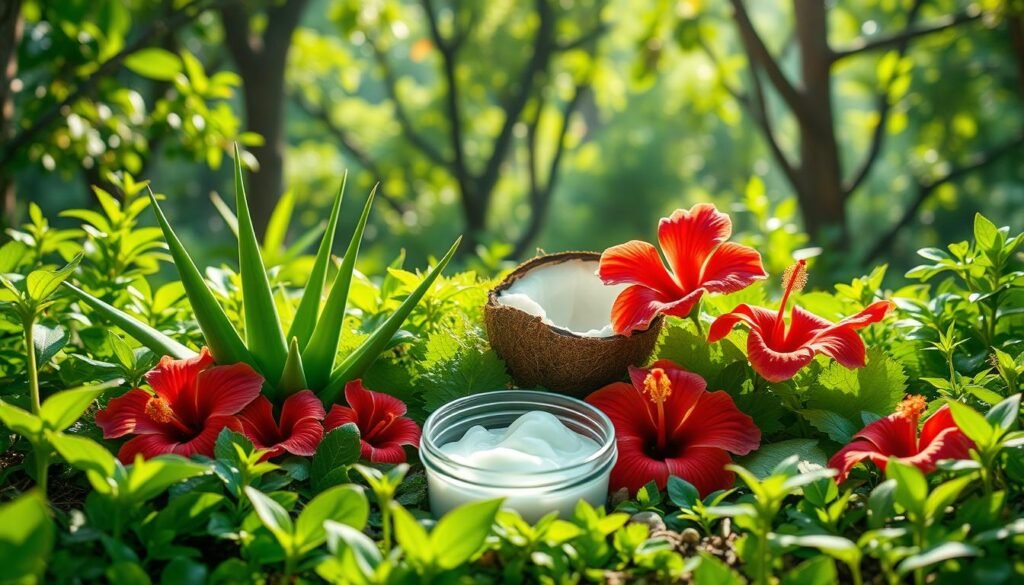
When to Seek Professional Help
While home remedies and self-care can be beneficial for maintaining healthy hair, there are times when seeking professional assistance is necessary. If you’re experiencing persistent hair loss, it’s crucial to identify the underlying cause and receive the appropriate treatment.
Signs of Underlying Health Issues
Sudden or excessive hair shedding, bald patches, or thinning hair can be indicators of an underlying health condition. These may include:
- Vitamin or mineral deficiencies, such as iron, zinc, or vitamin D deficiencies
- Hormonal imbalances, including thyroid disorders or polycystic ovary syndrome (PCOS)
- Autoimmune disorders, like alopecia areata
- Scalp infections or inflammatory conditions
Consulting a Dermatologist or Trichologist
If you notice any concerning changes in your hair or scalp, it’s recommended to consult a dermatologist or a trichologist (a specialist in hair and scalp disorders). These professionals can conduct a thorough examination, perform necessary tests, and provide tailored hair loss treatments to address the root cause of the issue.
A dermatologist can assess your overall skin and hair health, while a trichologist focuses specifically on the scalp and hair. They may recommend targeted therapies, such as hair loss treatments, topical medications, or dietary supplements to address vitamin deficiencies that could be contributing to your hair loss.
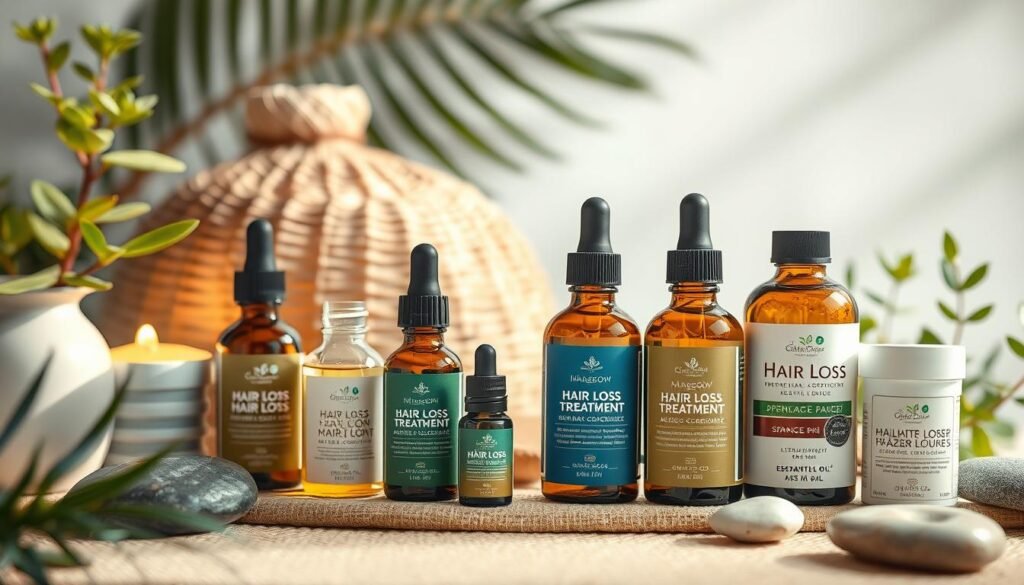
“Early intervention is key when it comes to addressing hair loss. Consulting a professional can help you get to the bottom of the problem and develop an effective treatment plan.”
Embracing Hair Growth Myths and Facts
In the pursuit of luscious, healthy locks, it’s essential to separate fact from fiction. While some widely-held beliefs about hair growth may seem plausible, modern Research has debunked many common misconceptions. By embracing evidence-based strategies, you can unlock the true potential of your hair and explore effective solutions for concerns like hair thinning.
Common Misconceptions
One prevalent myth is that frequent trimming can stimulate faster hair growth. However, studies have shown that while trimming may improve the appearance of hair by removing split ends, it does not actually accelerate the natural growth cycle. Another misconception is that certain hair products, such as hair regrowth products, can instantly transform thin or thinning hair. The reality is that these solutions, while potentially beneficial, require consistent use and patience to see measurable results.
Evidence-Based Strategies for Improvement
To promote healthier and more vibrant hair, focus on proven methods that nourish your scalp and hair from the inside out. Incorporating a balanced diet rich in vitamins, minerals, and protein can provide the essential nutrients for optimal hair growth. Additionally, gentle scalp massages and the use of hair thinning solutions that address the root causes of hair loss can contribute to a noticeable difference over time. By approaching hair care with a well-rounded, science-backed approach, you can overcome common myths and unlock the full potential of your hair.
FAQ
what are the best remedies for hair regrowth?
Some effective remedies for hair regrowth include essential oils like peppermint, rosemary, and lavender, natural supplements containing biotin, vitamin C, and iron, as well as scalp massages and DIY hair masks made with ingredients like coconut oil, aloe vera, and eggs.
what are the best hair loss treatments?
Proven hair loss treatments include minoxidil (Rogaine), finasteride, platelet-rich plasma (PRP) therapy, and low-level laser therapy. Consulting a dermatologist or trichologist can help determine the most suitable treatment plan based on the underlying cause of hair loss.
What are some natural ways to promote hair growth?
Natural ways to promote hair growth include incorporating nutrient-rich foods like salmon, avocado, and spinach into your diet, using gentle haircare products, reducing stress through activities like meditation, and regularly massaging the scalp with essential oils.
What are the best hair regrowth products?
Some of the top hair regrowth products include minoxidil-based solutions, ketoconazole shampoos, and hair supplements containing biotin, iron, and other essential vitamins and minerals. It’s important to Research and consult with a healthcare professional to find the most suitable product for your specific hair needs.
How can I address hair thinning issues?
To address hair thinning, you can try incorporating scalp massages, using gentle haircare products, managing stress, and addressing any underlying health conditions or vitamin deficiencies that may be contributing to the problem. Seeking professional help from a dermatologist or trichologist can also provide personalized solutions.
What are effective alopecia remedies?
Effective alopecia remedies may include topical treatments like minoxidil, corticosteroid injections, light therapy, and immunosuppressant medications. Lifestyle changes such as managing stress, maintaining a balanced diet, and using gentle haircare practices can also help promote new hair growth in individuals with alopecia.
How can I stimulate new hair growth?
To stimulate new hair growth, you can try scalp massages, using essential oils like peppermint or rosemary, taking supplements containing biotin, iron, and other hair-supportive nutrients, and addressing any underlying health conditions or vitamin deficiencies that may be contributing to hair loss.
How can I manage stress to promote hair growth?
Effective stress management techniques to promote hair growth include practicing relaxation methods like meditation, yoga, or deep breathing exercises, getting enough sleep, and engaging in regular physical activity. Reducing stress can help regulate the body’s hormone levels, which can positively impact hair growth.
